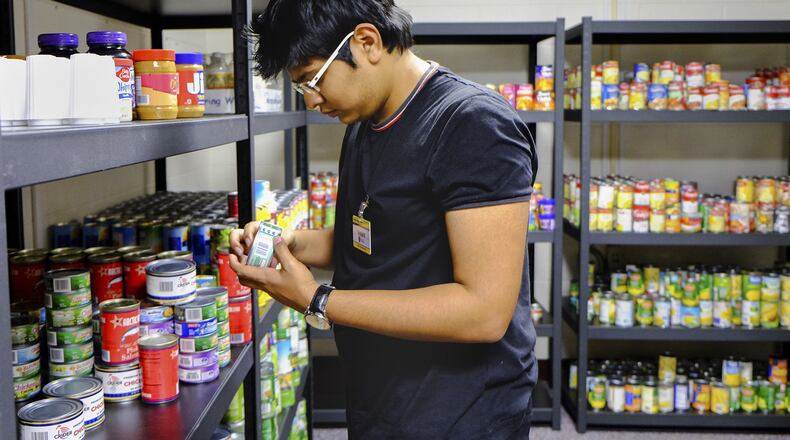A new report on poverty from the Ohio Association of Community Action Agencies identifies a dozen colleges and universities with food pantries on campus to serve students, including Wright State University. The pantries provide another illustration of Ohio’s college affordability problem.
“You might not see (poverty) on college campuses a lot but I do think it’s still there,” said Mary Case, coordinator of Wright State’s Friendship Food Pantry. “Unfortunately, being a starving college kid is almost expected. It’s almost become a joke.”
Wright State’s pantry was started in 2011 and is located on the first floor of Allyn Hall. The pantry, which serves anywhere from 10 to 50 students a week, is divided up into three small rooms, Case said.
The first room is where those in need present their student ID and class schedule, Case said. The second room, which is just big enough to fit two people at a time, is where students shop for food or hygiene products. The third room is where the 1,000 pounds of food people donate every month is stored, Case said.
The report found that 64 percent of students who have limited or uncertain access to adequate food also have difficulty with housing. One in four college students are “highly non-traditional” – working part-time or full-time, raising kids, or lack a high school diploma, the report says.
RELATED: Kasich to the GOP: Get out of the 1980s
Food pantries have opened at Wright State, Ohio State, Cleveland State, Kent State, Xavier University, the University of Akron, University of Toledo, University of Cincinnati, and four community colleges, according to the report. One of those community colleges — Owens in Toledo — saw a need and opened the pantry to staff members, said Phil Cole, executive director of the Ohio Association of Community Action Agencies.
The Project on Student Debt reports that among the two-thirds of four-year college students who borrow to attend school, the average debt upon graduation is $30,239.
The College and University Food Bank Alliance, a national association, had 400 members by the end of last year. In its report in October, “Hunger on Campus,” the alliance surveyed 3,765 students in 12 states and found 48 percent of them reported “food insecurity” in the previous 30 days.
RELATED: Dayton gets perfect score for diversity
The poverty report comes as federal cuts impacting colleges are in the works. The Trump administration is proposing a $3.9 billion reduction in discretionary Pell Grant funding for fiscal year 2018 and House Republicans on the Education and Workforce Committee plan to eliminate $65 billion in mandatory Pell Grant funds over 10 years.
Pell Grants, which cover up to $5,920 per school year, are used by 7.5 million Americans to attend college.
5 HIGHER ED MUST READS
• Sinclair increases fees, generating another $1.6 million in revenue
• London attack ‘cuts to the heart’ of democracy, area expert says
• Cost of ITT Tech implosion surpasses $141 million for taxpayers
• Leaders react to resignation of Wright State president
• BINGE DRINKING: Student death has area colleges re-evaluating

